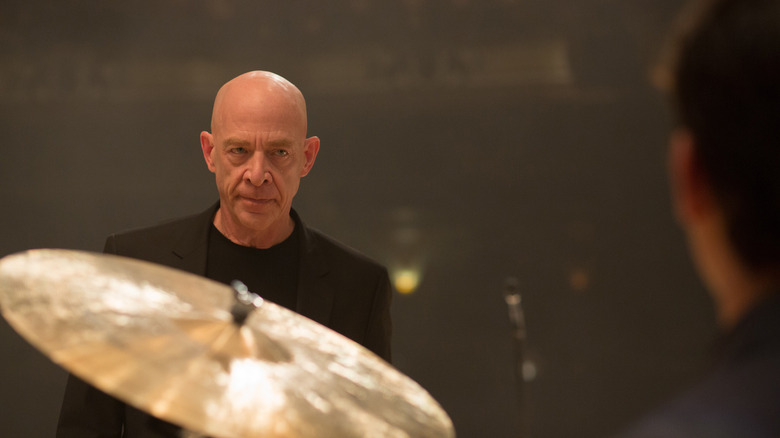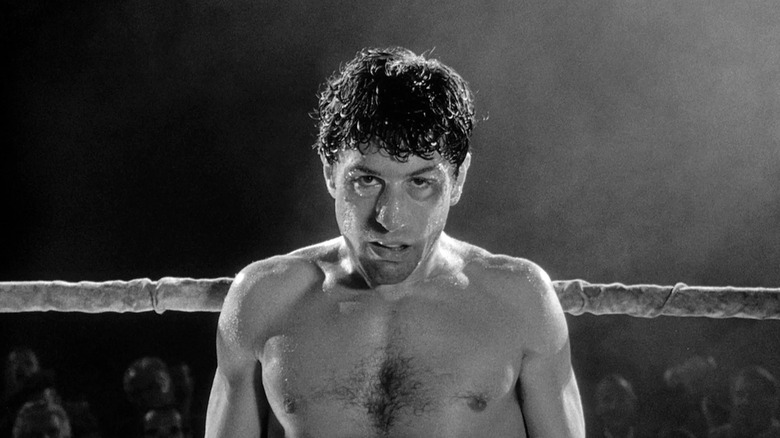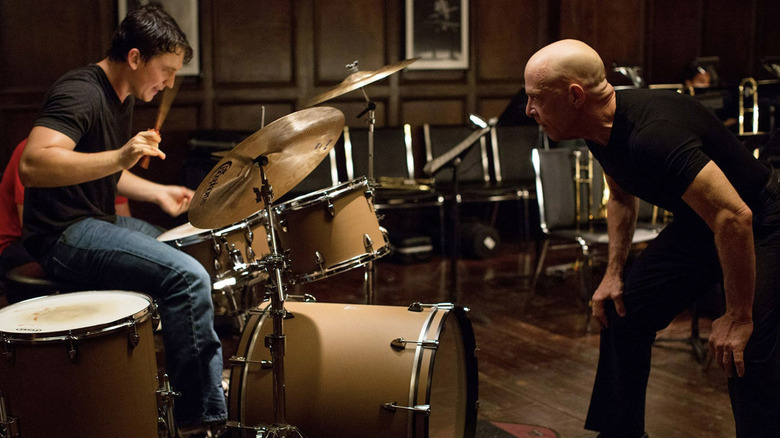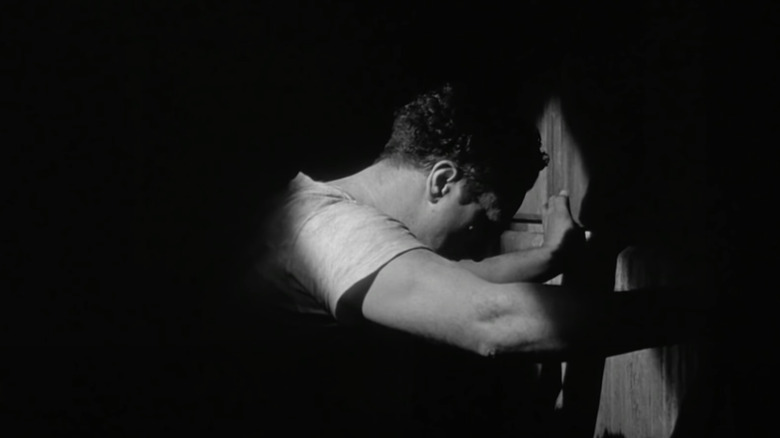Raging Bull Served As A Big Inspiration For Damien Chazelle's Whiplash
In Damien Chazelle's youth, his aspirations flip-flopped from filmmaking to jazz drumming and back again. He combined his two passions for his debut "Whiplash," a short he turned into a feature. Chazelle's story follows Andrew Neimen (Miles Teller), a drumming student determined to be one of the greats. First, Andrew has to survive the tutelage of Terence Fletcher (J.K. Simmons), who's basically Sergeant Hartman (R. Lee Ermey) from "Full Metal Jacket" if he taught at a conservatory instead of a boot camp.
One film which Chazelle cited as an influence was Martin Scorsese's "Raging Bull." Scorsese's muse Robert De Niro played Jake La Motta, the real-life "Bronx Bull" and championship boxer. As Jake picks up more and more notches on his boxing record, his personal struggles only grow.
Both films are about a man aiming to be at the top of a performing field: Andrew jazz drumming, Jake boxing. Both characters also use that work to indulge their personality issues (Andrew his perfectionism, Jake his rage). Both films also take great care to ensure their respective spectacle, the boxing fights and orchestral performances, are as engrossing as the character-focused moments.
When making "Whiplash," why did Chazelle draw on "Raging Bull" instead of a film centered around music? The director said he saw a link between the physicality of both boxing and drumming.
The same violent act
Interviewed by Matt Fagherholm for RogerEbert.com in 2014, Chazelle discussed how he thinks drumming, like boxing, is a violent act:
"'Raging Bull' is about a guy who hits people for a living, this is a movie about a guy who hits things for a living. Andrew's not actually whacking people with the stick, but it's still the same violent act. You're still f***ing whacking stuff, and there's still something about drumming that I find fundamentally violent."
This sort of violence manifests most obviously in "Whiplash" when a frustrated Andrew punches a hole in one of his drums. He then dunks his bleeding hands into ice water, a moment right out of a boxing movie. Chazelle mentioned this moment was inspired by personal experience:
"I broke a lot of drum heads and I broke a lot of sticks. I even whacked the cymbals. This is something that we didn't put in the movie and if we did, I bet people would think it was unrealistic. I would break a lot of cymbals. You whack the cymbals hard enough and they will crack in half. Drums are not actually as sturdy as they look. They're actually somewhat fragile instruments."
Both "Whiplash" and "Raging Bull" highlight how your body suffers when you push yourself too far. From Andrew's bloody hands to Jake's bruised face after his last bout with "Sugar Ray" Robinson (Johnny Barnes), the films both force you to ask if success is worth the pain. In Andrew's case, though, he has a voice screaming in his ear beside his own. This is where he and Jake's journeys differ.
War between teacher and student
"Whiplash" is about the unconventional war between Andrew and Fletcher. "Unconventional" because neither side is out to defeat the other in the traditional sense. Andrew can only "beat" Fletcher by gaining the man's approval of his musical skill. Fletcher, meanwhile, wants Andrew to beat him on some level because that means Andrew is (and Fletcher created) a great drummer. However, he's not interested in lowering his sky-high standards either.
Now, Andrew isn't guiltless in creating his own problems. He wouldn't have fixated on Fletcher if he weren't already a perfectionist obsessed with succeeding. He also spends the film pushing away both his father Jim (Paul Reiser) and girlfriend Nicole (Melissa Benoist), even though both offer nothing but support. However, it's Fletcher's influence that exacerbates Andrew's bad qualities. Chazelle has said that "Whiplash" even functions as an origin story for the next Fletcher: namely, Andrew.
"Whiplash" is a mix of internal and external conflict; Fletcher is basically a bulwark that Andrew's inner drive smacks up against. This means the film has a clear, despicable antagonist which "Raging Bull" does not.
Internal or external adversaries
The irony of "Raging Bull" is simple and elegant: Jake punches other men for a living, but his greatest foe is himself. He's a great boxer because he's an angry man in and out of the ring. His success as a fighter doesn't solve his fragile masculinity, though, so the violence bleeds over into his home life. Just before he earns the championship belt, he assaults his brother/manager Joey (Joe Pesci). Why? In a fit of pure paranoia, he believes his wife Vicky (Cathy Moriarty) is sleeping with Joey.
Near the film's end, Jake's alone in a jail cell. With no one left to hurt but himself, he starts punching the wall until the pain stops him. "Raging Bull" can be a tough sit and no moment is rawer than Jake's wails of despair (I must also say it's one of De Niro's finest moments on screen).
In the film's closing scene, Jake recites the "I coulda been a contender" speech from "On The Waterfront" to himself in a mirror; he's accepted that he's to blame for his own downfall. Scorsese, like any good Catholic, believes in redemption, though not the idealized idea of it common in Hollywood.
Chazelle, on the other hand, thinks it's all downhill for Andrew. "Whiplash" ends when Andrew finally wins over Fletcher with an exemplary, self-led drum solo, but the director argues that this was a hollow victory:
"Fletcher will always think he won and Andrew will be a sad, empty shell of a person and will die in his 30s of a drug overdose. I have a very dark view of where it goes."
Jake LaMotta knew when to stop hitting things, and Andrew Neiman didn't.



